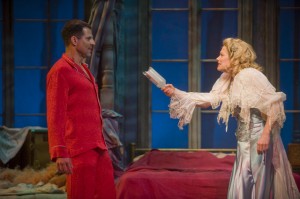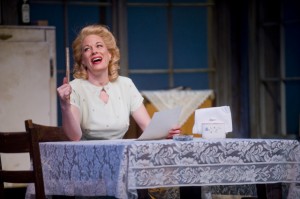Culture Vulture: A Timely “Streetcar”

Blanche DuBois (Marin Mazzie) and Stanley Kowalski (Christopher Innvar) battle it out in the Barrington Stage Company production of “A Streetcar Named Desire,” which runs through August 29.
by Helen Epstein
Go here for information about a live-chat, scheduled for August 23rd, with Helen Epstein on “The Art of Narrative Writing.”
“But isn’t he outdated?” asked my German journalist friend Henryk Broder re: Tennessee Williams who wrote “A Streetcar Named Desire” well over 60 years ago.
“Yes,” I replied. In some ways, American culture has more than caught up with Williams’ once-shocking play — especially the sexual bits. Nothing that happens onstage shocks us anymore — not the drinking, not the out-there eroticism, domestic violence, molestation of a high school student, certainly not the revelation of Blanche’s young husband’s homosexuality. But there’s plenty more for actors, directors and audiences to chew on — witness the many revivals and operatic and dance adaptations of the script — as well as its instrumental role in Pedro Almodovar’s film “All About My Mother.”
Julianne Boyd, co-founder of the Barrington Stage Company in Pittsfield, is one of the directors who has wanted for years to do the play. A powerhouse who developed a highly successful theatrical institution in 15 years, she is chiefly known for directing a string of very successful musicals, and for conceiving the Broadway show “Eubie!” based on the music of Eubie Blake. She was also, for a time, an academic, whose doctoral studies had focused on classical Japanese theater. Her varied interests and skills seemed important as I watched Boyd’s impeccable, measured production of “Streetcar” in which the actors, lone trumpeter, blues singer, and the recurrent soundtrack of streetcars merged into a leisurely evocation of 1940s working-class New Orleans.
For most of us, Stanley and Stella Kowalski are indelibly associated with Marlon Brando and Kim Hunter, who played the roles on Broadway in 1948 and in the 1951 movie version directed by Elia Kazan. Tennessee Williams conceived Blanche DuBois with the over-the-top neurotic Tallulah Bankhead in mind. She was played on Broadway by the diminutive Jessica Tandy and in the film by Vivien Leigh/Scarlett O’Hara whose wishful thinking and languid intonations of Williams’ most famous lines are hard to forget.
Working in the shadow of that legendary director and those legendary actors whose work is still available on DVD must have been daunting for all concerned but this company plays the play as though it were the first time. With shock value and Marlon Brando absent, the audience has almost three hours in which to ponder the complex interpersonal dynamics of the characters, particularly the relationships between the men as a group and the women; and the complicated relationship of the two sisters.
Three hours (there is one full-length intermission and one five-minute pause in this three-act play ) is a long time to sit in a theater but this production of “Streetcar” rarely flagged. Each of the cast members was interesting to watch and the various patterns into which they fell fascinating.
Boyd has cast against type: the self-absorbed, self-deluded, self-dramatizing Blanche DuBois is less obviously neurotic than her predecessors. She is played by Marin Mazzie, a tall, regal, even robust actress who enters with the authority of an opera star, seems anything but helpless, and who falls apart slowly, over the full length of the play. Her story is revealed bit by bit. My husband, who had not seen “Streetcar” before, had no clue what would happen after Act I.

Marin Mazzie supplies an unusually aggressive Blanche DuBois.
Stella is also cast against type: she is played by small, agile Kim Stauffer who appears so frail at times that she might herself have been cast as Blanche. Stauffer jumps into Stanley’s arms whenever he returns home, like a small pet, and looks so child-like as the little sister that when Blanche commandeers her services and Stanley strikes her, one wants to get out the phone and call the police.
Stanley is played by Christopher Innvar who brings to the role less of a canny sexual predator and more of an Every-Day- Working-Class-Man whose pleasures include sex, food, beer and bowling. He is more a boor than a brute, unable to hold his liquor, apt to do things he sincerely regrets when drunk, and deeply loyal of his wife and marriage.
This shift in traditional casting does interesting things to the choreography of the players. Stella and Stanley are passionate partners and Stella seems less victimized by her husband than by her imperious older sister, who becomes the predator of the piece. The sisters are shown to be fierce rivals, with an increasingly deranged Stella blaming her misfortunes on the younger sister who got out before the family fortune and ancestral home, Belle Reve went down the tubes
Stella’s seduction of Stanley’s bumbling friend Mitch reads like pure and simple exploitation: even her confessions of losing her young homosexual husband to suicide and being suspended from teaching in Laurel’s high school because of an affair with a 17-year-old student seem like calculated, well-rehearsed, moves in a desperate campaign to save herself from ruin. A schoolteacher, Stella sees herself in a class far above the others, including her sister, but she comes off as the one with the most smarts until Stanley’s rage (and rape) put her over the edge.
Boyd’s production reminds us just how limited the range of life possibilities for women were in mid-twentieth century America. Blanche might just have well been in a Jane Austen novel in terms of her financial prospects. As the practical upstairs neighbor and wife with her own marital issues, Jennifer Regan’s Eunice provides an interesting contrast to both Stella and Blanche, as does the sensual and easy-to-listen to blues singer Chavez Ravine.
A wonderful evening of theater and a classic worth seeing again and again!
Helen Epstein is the author of “Joe Papp: An American Life” and “Tina Packer Builds a Theater.”
Tagged: A Streetcar Named Desire, Barrington Stage Company, Berkshires, Culture Vulture, Julianne Boyd

